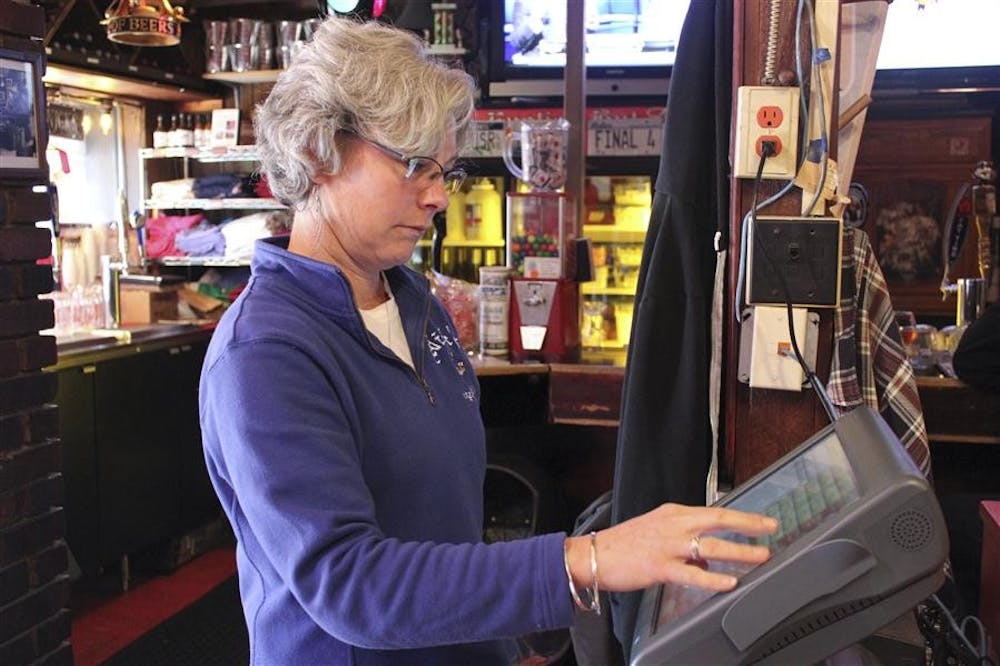Men in baseball caps and women with their hair pulled back in loose ponytails sat at the bar in Nick’s English Hut, jars of beer sweating in front of them. On the Big Ten Network, Wisconsin played Minnesota in hockey. Analysts on SportsCenter talked about Hue Jackson, who had recently been fired as head coach from the Oakland Raiders. Regular customers needled the bartender about when he planned to retire.
The atmosphere of the bar was relaxed and welcoming, its normal feel for a weekday afternoon. A sign posted on the bar’s glass door that requested customers to pay with cash was the only hint of a disturbance, one that has plagued the bar for months.
On Nov. 23, 2011, the day before Thanksgiving, Susan Bright, Nick’s co-owner and financial analyst, received a disturbing phone call from a prepaid debit card company.
Bright sat in a wraparound booth at the front of the bar as she remembered the call, trailing her nails along a tabletop she had just wiped down.
The company had flagged several “suspicious transactions” with Nick’s that were each just below $1,000.
“When you go to a retail store and return a piece of clothing, they ask you if you’d like to put it back on your credit card,” Bright explained. “That’s what happened, but they’d never purchased anything.”
An individual or several individuals not associated with Nick’s had claimed, with the use of prepaid debit cards, returns from Nick’s that drew funds from Nick’s account.
“This was almost $8,000 that was being requested out of our account and onto their card,” Bright said.
But within two hours of that initial phone call, the claimed funds exceeded $1.2 million. The processor shut down Nick’s credit card transaction system.
“The way I saw it, those transactions were happening within hundredths of a second of each other,” Bright said.
Cydney Pair was working the lunch hour while Bright fielded the devastating calls. She said she wasn’t told exactly what was happening, and Bright wasn’t entirely sure what to tell everyone.
Pair said customers were not pleased with the news that they could not use their credit cards. Bright said the experience was overwhelming.
“I had a full house downstairs,” Bright said. “Lunch was full, and I had to figure out how to process their credit cards.”
The processor was able to introduce a voice authorization system to run credit cards, though the process took about five minutes per transaction.
Bright said this was fine for lunch on a weekday, but she worried about the upcoming weekend. Weekends are usually busy at Nick’s, but she expected an even larger crowd because of the home football game against Purdue.
Fortunately, by 3 p.m. Friday the processor had opened credit card transactions again, and half of the fraudulent funds had been reversed.
“We’re still liable for half of that,” Bright said. “That’s $580,000.”
Nick’s owners are not paying that money now. The FBI has not yet discovered who committed the fraud, and the liability for the remaining $580,000 has yet to be determined by a court.
“It was the processor that was hacked, and no one wants to take responsibility for it,” Pair said.
Bright said whether the fault is with Nick’s or the processor has yet to be determined.
Now, Bright encourages customers to pay with cash, though they are still welcome to pay with credit cards. She said she wants to build the cash on-hand for Nick’s, but she also wants to begin dialogue with customers about credit card theft.
“They’re more aware of what happens with their credit cards,” Bright said. “I’ve learned that you’re very vulnerable.”
Cash sales are up 50 percent from 20 percent since Nick’s staff posted the sign, Bright said.
“People are so used to using their credit cards, so at first it was like, ugh, cash,” Pair said.
But she said that once people knew the reason behind the sign, there were very few complaints.
Andrew Corr, an IU senior, sat at the bar with a friend watching ESPN and glancing absentmindedly at the menu. A loyal Nick’s customer, he said he didn’t know why the sign had been posted, but he followed its instructions.
“We went to an ATM because we didn’t have cash, but we still came here,” he said.
Corr used to work as a bartender, so he said he understood the necessity of cash transactions.
“There’s something more personal about paying with cash when you’re in a bar for lunch,” Corr said.
Bright said customers have waved cash at servers in the aisles, showing their support for the Bloomington staple.
“It’s kind of like when you have a death in the family, and everyone feels the loss,” Bright said. “We have such a huge family of Nick’s customers. They’re feeling our loss, and they’re expressing that sympathy.”
She said Nick’s owners have always worked well with their local community, so she believes no customers or Nick’s employees are at fault. She added that the vendors, bankers, lawyers, accountants and FBI agents working to clear the difficulty have shown great support for the business.
“We’ve had 84 years of good business practices, and I’m looking forward to the next 100 of them,” Bright said.
Nick's English Hut recovering from fraudulent credit card charges

Get stories like this in your inbox
Subscribe





